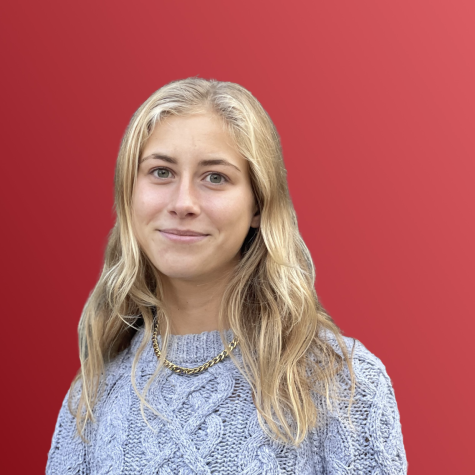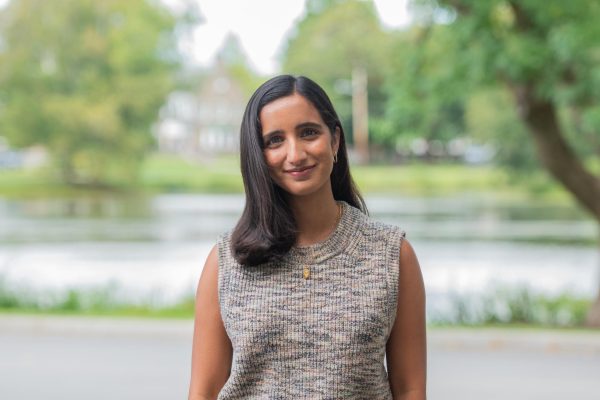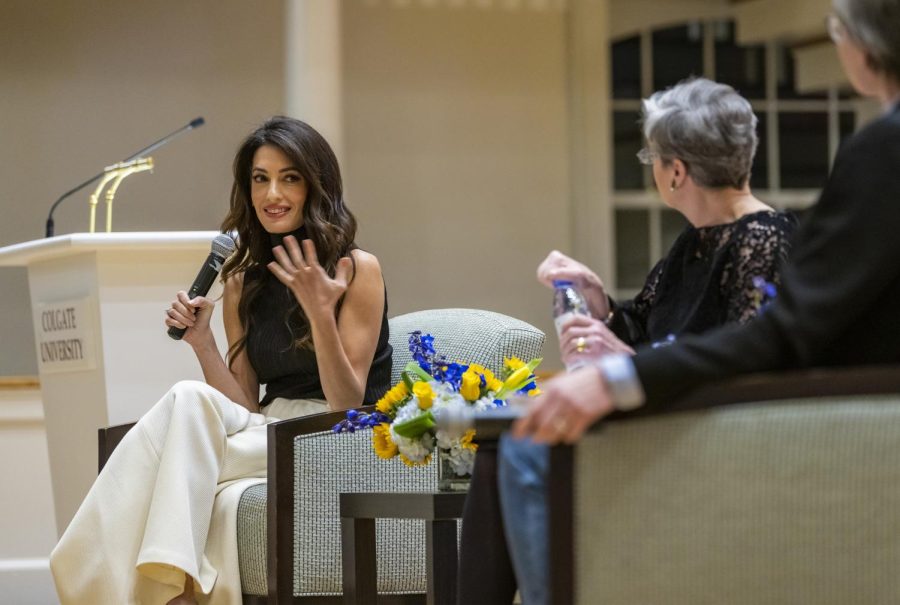Amal Clooney Headlines Colgate’s Celebration of 50 Years of Women
Mark DiOrio/Colgate University
International Human Rights Lawyer Amal Clooney answers a question in the Colgate University Memorial Chapel during a speaking engagement as part of the University’s celebration of the 50th anniversary of women at Colgate.
The Kerschner Family Series Global Leaders at Colgate hosted Amal Clooney in honor of the 50 Years of Coeducation celebration on Saturday, March 5, beginning at 6:40 pm at the University Memorial Chapel. Clooney is a world-renowned human rights and international lawyer and a professor at Columbia Law School. Clooney has represented clients before the International Criminal Court, European Court of Human Rights, and the International Court of Justice, among others. Her clients have included victims of genocide and sexual violence.
Among one of her many high-profile cases, Clooney was a part of the world’s first trial against a member of ISIS, or the Islamic State militant group. She is also an advocate for political prisoners and has helped free journalists who are unfairly detained. Besides her extensive legal career, Clooney helped found the Clooney Foundation for Justice, which “aims to advance justice through accountability for human rights abuses around the world,” according to Clooney’s bio for the event.
The Memorial Chapel was packed with students, faculty, alumni and parents as President Brian Casey commenced the evening with opening remarks. Faculty members Susan Thomson and Ellen Percy Kraly co-moderated the event — Thomson is an Associate Professor of Peace and Conflict Studies and Director of the Women’s Studies Program and Kraly serves as Interim Provost and Dean of the Faculty, the William R. Kenan Jr. Professor of Geography and Environmental Studies and director of the Upstate Institute.
Thomson and Kraly asked questions formulated by a group of students in the weeks leading up to the event. Kraly began the conversation, prefacing Clooney’s interest in conversation as part of the decision to conduct the evening in a conversational manner.
Many of the cases Clooney spoke about involved the protection of political prisoners, particularly journalists who have been unfairly imprisoned due to their work.
Involved in the planning of this event was the Office of Alumni Relations, and Associate Vice President Alumni Relations, Annual Giving and Leadership Giving, Jennifer Stone who spoke about the intentions behind the event within the context of the 50 Years of Women at Colgate celebration.
“The weekend was framed around women of inspiration and influence,” Stone said. “The framing around the entire weekend […] was really about providing an opportunity for all Colgate alumni, parents, friends, students to think about how women are going to have a more important influence than ever in Colgate’s third century.”
Prior to the event, Clooney met with roughly two dozen students in a small group discussion at the basement of the Chapel — the cohort included those who developed questions asked during the event. There, she answered candid questions from the students and spoke with them about her work as a lawyer. According to senior Larsen Klein, students and advisees of Professor Thomson in the Women’s Studies department were invited to join this group discussion.
Among those to pose questions was sophomore Ellie Markwick, who asked Clooney about potential consequences Vladimir Putin could face for recent actions against the civilian population of Ukraine and asked how Clooney chooses which clients to take on, and the differences between representing a state versus an individual.
“I thought her response to my question in the second group was really insightful, and I appreciated that she was hopeful about the possibility of justice being served,” Markwick said.
Clooney gave candid, full responses to students’ questions. When asked about how she chooses which cases to represent, Clooney responded that because of where she is in her career, she “can focus on the simple issue of impact.”
“I am hopeful a case can be built with solid evidence…I hope there will be accountability,” Clooney said in response to Markwick’s question about Putin’s actions in Ukraine.
First-year Leah Massa, who also attended the small group discussion, was impressed by not just Clooney’s intelligence, but her personality.
“She is so incredibly intelligent and well-spoken, but above all, seems so kind and genuine. I would imagine that being in the field she is in and having to witness so many atrocities would harden you, but she was incredibly personable.”
Klein further commented on the impact Clooney’s visit had on students looking toward a legal career, noting the hope and inspiration she brought to students.
“Getting to attend the private reception beforehand was awe-inspiring as Amal spoke on her own personal journey and answered some of our other questions,” Klein said. “I think it gave me a lot of hope, as somebody looking towards a legal career, that there are not just multiple ways to enter the legal industry but multiple pathways to conducting human rights or social justice work on an interpersonal, domestic, and/or international level.”
Clooney touched on a variety of topics, ranging from her specific legal work to more broader issues, including legal challenges to abortion in the United States, police violence, the intersection of climate change and forced migration, economic sanctions, genocide, sexual violence and the dismal state of democracy and free speech in some nations. However, she offered some optimism, especially geared towards student attendees.
“We’re counting on you,” Clooney said — the statement was met with roaring applause from the audience.
Stone echoed this sentiment.
“The opportunity that this next generation has to make positive change […] will have implications for not only Colgate, but the world. So, I really liked that as being part of [Clooney’s] charge to our students,” Stone said.
Clooney concluded her discussion on a hopeful note — that she feels lucky to be able to practice her philanthropic interests on a global scale and further encouraged students to be the next generation of leaders. Clooney added that the phrase “international community” is made up of individuals, citing those who help others in need.
“I hope you all feel that you can make a difference,” Clooney said.

Annabel Morris is a senior from Rumson, NJ concentrating in political science and minoring in Middle East & Islamic studies and anthropology. She has...

Maya Karkhanis is a senior from Hillsborough, NJ concentrating in international relations, religion, and Asian studies. She has previously served as an...







